10 months ago, as part of a series on user retention I made a post which divided the Hive userbase into 'cohorts' based on the year that they joined. The series was pretty popular, I have recently noted that user retention is improving on Hive and since I reused the same methodology yesterday on the Hispanic community in Hive, I felt like it was time to revisit the idea with updated statistics.
Cohorts
In demographics a cohort is a group of people either all born in the same time period, or joining something in the same time period (such as a University). In this post I will divide the Hive community into 27 cohorts based on when they joined the network, 4 for the years from 2016 to 2019, 8 for the quarters of the years 2020 and 2021, and 15 for the months beginning January 2022.
Active Authors
Here is an updated Monthly Active Authors chart, with a colour-breakdown of which cohort they belong to.
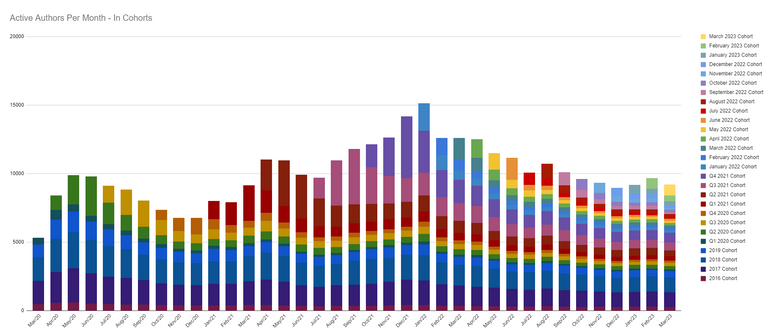
It can be clearly seen that older cohorts, those from 2021 and before, make a large majority of the active posters on Hive to this day.
When it comes to posts per month, older cohorts make an even larger majority of the posts.
When we graph by post rewards (ie. author rewards excluding comments) we can see how the lowering price of Hive squeezes post rewards overall, and then the older cohorts are receiving 80% of those rewards today.
In past analyses, it has been determined that post rewards do not have any substantive impact on user retention at least in terms of the absolute amount, but it is possible that relative rewards can have such an influence.
User Retention
It may not be immediately clear, but the charts above tell a story about user retention on Hive. The longer a user stays, the more they become established. They are earning more rewards and they are less inclined to leave (whether or not that is causal in either direction). Users who have not been in Hive for long, and are not well established, are much more likely to become inactive.
The somewhat messy chart below shows the relative change in active authors for each cohort every month.
The high rates for the first month are due to the Steem/Hive hard fork*. What you can see in this chart is two things - there is a general trend towards 0% change for each cohort, indicating higher retention as the cohort gets older, but also there are some periods where many users come back temporarily. These mostly represent bull markets for Hive such as through 2021, but the most recent spike is more difficult to describe as a 'bull market'.
In the chart above I excluded the pre-fork users in March, and therefore April appears unusually high. The alternative approach would have made it look unusually low, so it is much of a muchness.
The most important month for user retention is probably the very first. The first month invariably has the lowest retention for every new cohort. We can see this charted in another way below.
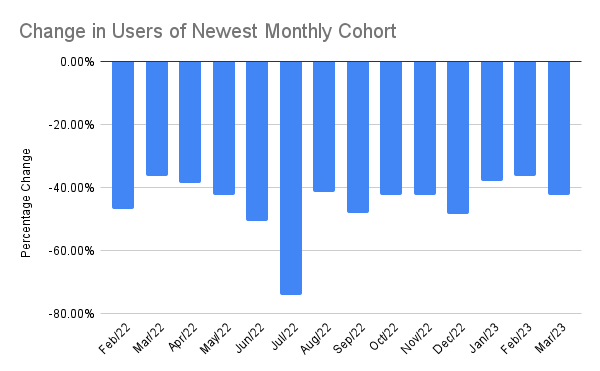
I charted only since 2022 since those are the monthly cohorts I defined before. Every month we lose 40% of our newest users. Aside from an exceptionally bad month in July for some reason, there is no clear trend here. We are neither getting better or worse at retaining our newest users, which would likely have a much bigger impact on growth than our ability to retain established, long time users.
Edit: Looking further into brand new user retention, I charted the number of users who made a post or comment within 30 days of joining, and compared them to how many of them post between the 30 and 60 day window after joining. This metric has sadly stayed poor for the entire lifetime of the network (Steem and Hive).
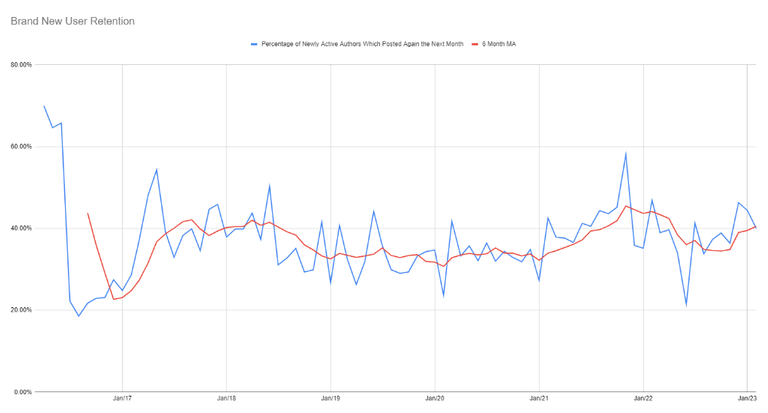
Steem era average: 36.57%
Hive era average: 37.97%
https://d.buzz/#/@demotruk/c/zy2io22z0ttpcfstdjop8h
Conclusion
User retention on Hive has been improving, as has been determined before. Those improvements relate to increasing user retention among our more established userbase, the longer someone stays, the more likely they become (or were always inclined to be) a die hard user who is less likely to leave. Unfortunately there is not any clear improvement in our retention of the newest users.
The good news is that the Venezuelan/Hispanic community retention is a little bit healthier, although they too feature the same overall dynamics.
Thank you for reading, I hope you found some useful insight in the data presented here.
My statistics and analysis posts take many hours each to research, chart and write, so if you find them valuable and of interest to other Hivers, I appreciate your support in sharing, commenting, and/or upvoting my work. If you're interested in these kinds of stats posts, click the 'follow' button on my profile, or subscribe to the Hive Statistics Community which features daily Hive stats posts from @arcange as well as less regular posts from myself and others.
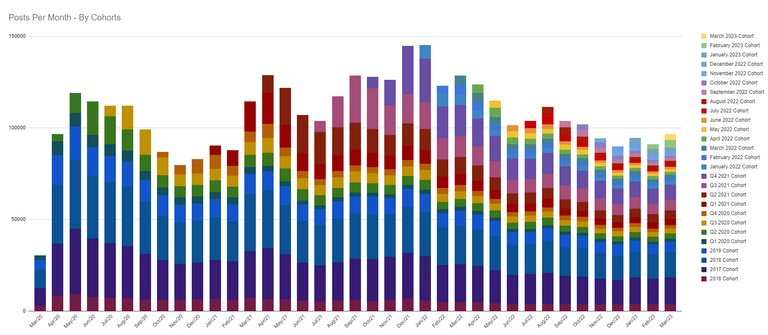
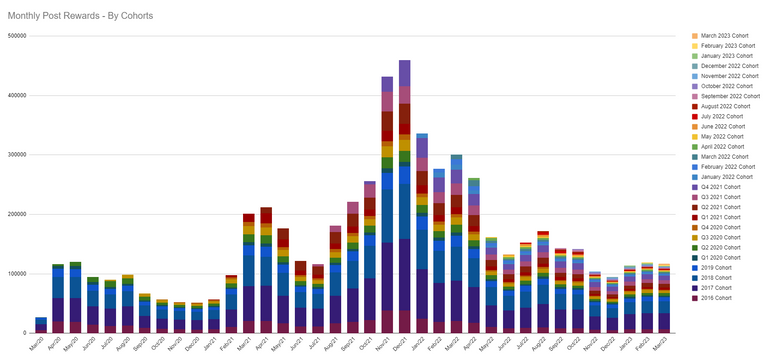
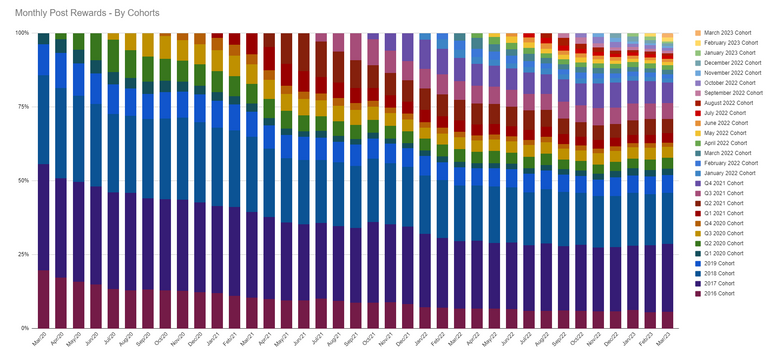
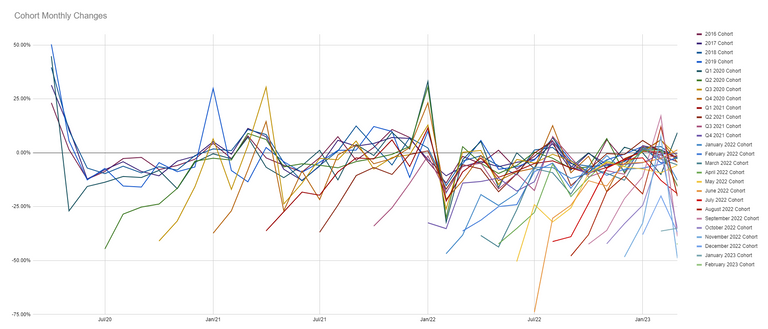
Would you be interested in doing something similar for our onboarding program, btw? I could give you all the usernames involved somewhere on Discord or something. Would be very interesting to be able to compare when they joined, how long they stayed, who the onboarders were, etc in comparison to more regular joiners of the network.
Yes, asbolutely. We have already added eachother as friends on Discord so absolutely just send me the list of creator accounts there.
Barring any unforeseen technical challenges of course.
Awesome, it's getting late here but will try send them over asap! Thanks!
Those who have been around for a while will also have friends here. That can be a major reason to stick around regardless of the rewards. It's what keeps people on other platforms.
We do need to retain more of the newbies. I have dropped some hints about the 'Hive police' driving some away. I don't think you can judge someone just by one post as they may not realise how different Hive is from other platforms. It helps if they have someone to mentor them, but that can be a lot of work. Building an engaged following takes time.
Hear Hear!
The 'Hive police' need to have more mercy and understanding and educate new users who infringe community norms, not just punish them.
Very interesting analysis which backs up what I thought.
The longer you stay the more likely you are to stay.
Its a real human community, but one which is not easy to get established in.
Perserverence and commitment is required.
Love this demo! I might try to replicate this one as well. HAHA thanks man for the inspiration.
I can see you put a lot of effort into producing these statistics, congratulations on that. 👏🏻 Being from Venezuela, I can add that the general economic situation of the country can encourage us to persevere within the platform. Greetings.
Thank you for talking about how to keep users on Hive. It's interesting to see how user retention is getting better among the platform's long-time users, who are more likely to be loyal and less likely to leave. But it's worrying to see that there's no clear improvement in keeping the newest users and that 40% of the newest users leave every month. Your post has useful information and ideas. I really like it.
The rewards earned on this comment will go directly to the people( @demotruk ) sharing the post on Twitter as long as they are registered with @poshtoken. Sign up at https://hiveposh.com.
These are some really interesting analytics, will have to look at them a few more times, haha.
I'm very sure that I will be one of the active authors these days
Hahaha
I'm becoming more active.